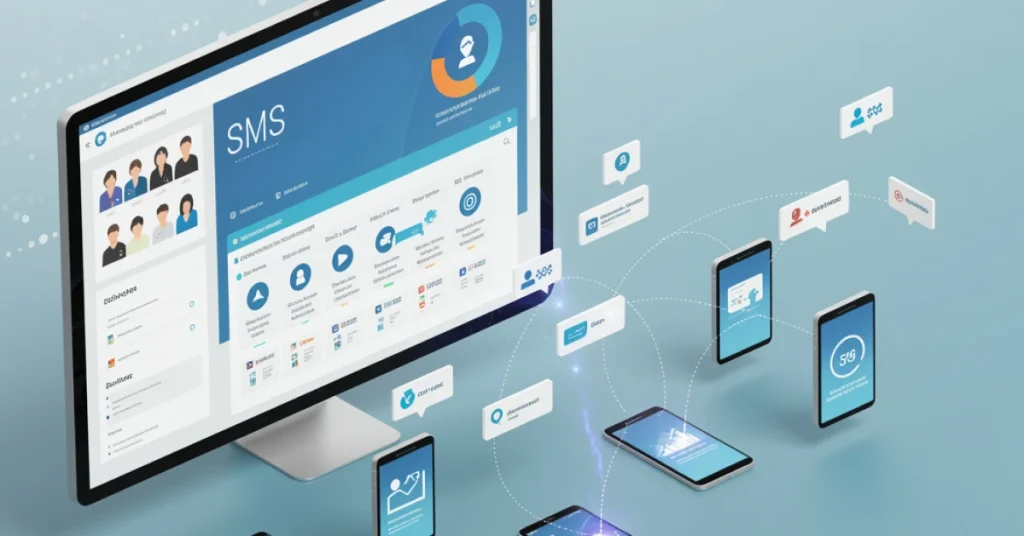How to Choose a Business Phone System in 2026?
- August 31, 2025
- 11 Mins Read
- Listen

Your phone system is the lifeline of your business. Whether you’re answering customer queries or collaborating with your team, it is the phone system that gets things done. In short, it’s the key to staying professional and connected. But with so many choices out there- from landlines, VoIP, PBX, or hosted PBX to cutting-edge cloud systems like UCaaS – finding the best solution can definitely feel overwhelming. So, how to choose a business phone system that fits in just right?
Through this post, we’ll walk through everything you need to know: different types of business phone systems, various essential features to look for, cost factors, setup considerations, industry-specific needs, and practical tips to make the right decision. By the end, you’ll have a clear blueprint to select a phone system that aligns with your budget, growth plans, and communication goals.
Why Your Business Phone System Matters?
Your phone system is the front door to your business or company – it is the one that provides your business’s first impression to your customers. A phone system that lets customers connect with you seamlessly and instantly will certainly boost professionalism, customer satisfaction, and a lot more. But what if your customers struggle to reach you, or they experience dropped calls? Or get confused with highly complex menus? They are simply not going to call back.
So, in other words, we can say that your phone system isn’t just a tool to make and receive calls; rather, it is your foundation to build trust, streamline workflows, and enable business growth.
Types of Business Phone Systems
We just learned the importance of having the right phone system in a business environment. Before we dive into how to choose the best fit, let’s explore the different types of phone systems that are typically found in business setups:
1. Traditional Landline Systems
We all have used traditional landlines at one time or the other time in our lives. These are copper-wired phone systems provided by local telecom companies. Traditional phone systems are best for businesses with minimal internet access or those that prefer on-premise hardware. Some key pros include reliable, simple to use, and minimal training needed. However, there are some cons as well, including being expensive, having limited features, not being scalable, and being phased out in many regions.
2. PBX (Private Branch Exchange)
As a modern replacement to a traditional phone system, a PBX system is a private phone network within your company that routes calls internally and externally. These systems come in variants, including on-premises PBX, which has hardware at your office, and Hosted PBX, which is cloud-based and is managed by a provider. Some of the key pros of PBX systems include advanced features like call transfer, voicemail, and extensions. These systems have some potential cons, such as hardware costs for on-premise PBX systems as well as maintenance burden.
3. VoIP (Voice over Internet Protocol)
The global mobile VoIP market size was valued at USD 49.2 billion in 2021 and is projected to reach USD 327.5 billion by 2031, growing at a CAGR of 21.1% from 2022 to 2031. Source
One of the most advanced telephone systems that operates via the internet. This means phone calls are made via the internet instead of traditional lines. These systems are best for businesses seeking cost-efficiency and modern features. Some of the key pros of VoIP systems include low cost, scalable, support for remote teams, and integration with apps. Like every other technology, VoIP too has some cons, including being dependent on a stable internet, and may need QoS (Quality of Service) setup.
4. Cloud-Based Phone Systems (UCaaS)
The Global Unified Communications as a Service (UCaaS) market is substantial and rapidly growing. Fortune Business Insights reported a market value of USD 48.79 billion in 2023, with a projected increase to USD 215.53 billion by 2032 at an 18.2% CAGR. The growth is driven by factors such as the demand for remote work, integration of AI, and increasing adoption by both SMEs and large enterprises across various sectors like healthcare and IT.
Cloud-based systems are a preferred choice of many businesses seeking integrated phone systems with advanced functionalities. A cloud-based phone system is a fully online communication solution combining voice, video, messaging, and collaboration. The best part about these modern phone systems includes pay-as-you-go pricing, zero maintenance, remote-friendly, and scalable. In terms of cons, one needs a strong internet, ongoing subscription costs.
Key Features to Look For in a Business Phone System
When evaluating different types of phone systems, a business should consider what features will actually benefit their team and customers.
Some of the most essential and useful features to look for in a business phone system include the following:
1. Auto-Attendant / IVR
This feature helps businesses present a professional image to their customers. The primary function of an IVR is to automatically route callers to the correct department.
2. Call Forwarding
Another extremely useful feature a business phone system can offer. Call forwarding ensures calls reach the right person, even if remote.
3. Voicemail-to-Email/Text
Modern businesses operate from anywhere, and this feature helps them do so quite effortlessly. Users can simply access voicemail messages right from their inboxes, making things a lot easier when they are on the go.
4. Conference Calling / Video Calling
Besides customer interactions, modern phone systems also offer features that businesses can use to enhance communication and collaboration within their teams. Conference calling and video calling features
5. Mobile App Access
Another important feature a business phone system should have is a mobile app. In an era where we have mobile apps for everything, your business phone system should also be accessible via a mobile app. This is useful for remote and mobile employees.
6. Analytics & Reporting
While your business phone system enhances various business areas, it must reflect the same with analytics and reporting so that you know where your business is doing well and where it needs improvement. With these features, you can track call volume, missed calls, and customer wait times.
7. CRM Integration
This feature can boost call conversation quality as agents can connect calls with customer records for seamless service. Your existing CRM system gets integrated with your business phone system, enabling access to existing customer interactions.
8. Scalability
A phone system should be able to scale up and down as your business grows. Scalability is a feature with which you can easily add/remove users as your business evolves.
Advanced Features To Consider While Using a Business Phone System
Besides the basic ones, there are some advanced telephony features that you can look for if you want more benefits from your phone system.
- AI-powered call insights.
- Call recording for training and compliance.
- Multi-level IVR for enterprises.
- International calling packages.
- Team collaboration tools like chat, file sharing
Step-by-Step Guide to Choosing the Right Phone System
Now comes the practical part – selecting the most appropriate phone system for your business. Here’s your roadmap for the same:
Assess Your Business Needs
Before you proceed with vendor research or anything else, first evaluate what exactly you need. Therefore, answer these questions first:
- How many employees need phone access?
- Do you have remote teams?
- Do you serve international customers?
- Do you need call recording for compliance?
- What integrations (CRM, ERP, helpdesk) do you need?
Set a Budget
Your next step should be to evaluate the amount of monetary resources you really want to spend on getting your business phone system. Make sure you know the cost-related information about each type of phone system below.
- Traditional PBX: Higher upfront hardware costs.
- VoIP/Cloud: Lower upfront, predictable monthly fees.
- Hidden Costs: Installation, training, hardware (headsets, IP phones), maintenance.
Insight: VoIP can help small businesses reduce startup costs by up to 90%. More? Companies can also reduce phone costs by up to 50% with VoIP.
Evaluate Providers
When you start your research about business phone systems providers in the market, you will find plenty of options. To shortlist the most suitable ones, compare:
- Pricing models in terms of per user, per minute, flat rate
- Reliability in terms of uptime SLAs, disaster recovery
- Customer support availability
- Security compliance in terms of GDPR, HIPAA, and PCI
Test Before You Commit
When you have shortlisted a few telephony providers, the next wise thing to do is – use the product yourself and see its suitability. You can do so by:
- Requesting demos or free trials.
- Testing call quality, features, and mobile apps.
- Checking the ease of onboarding.
5 Common Mistakes to Avoid
By now, you should be able to select the right phone system for your company. But wait, some common mistakes are often made by businesses:
1. Choosing Based On Price Alone
Many business owners make the mistake of keeping cost as the primary criterion. Always remember that cheap systems often lack support or reliability; therefore, look for a system with reasonable cost.
2. Ignoring Scalability
Selecting a phone system that is not able to scale might create problems for you in the future because outgrowing your system can be costly later.
3. Forgetting About Integrations
A business phone system with integration functionality is a bonus for your company. Ignoring this can lead to inefficiency and manual work.
4. Not Testing Before Buying
Buying a phone system for your organization is an exciting venture, but you should never do this in a hurry. If you simply go with the words and plan to test the system after purchase, then you might have to face disappointment. It is because systems with poor call quality or complex systems can frustrate employees.
5. Overloading with Features
Always make sure you don’t pay for the features or tools you don’t use because it adds unnecessary costs.
Industry-Specific Considerations
Now, let’s be more specific. Here are some considerations you can make according to the industry you are operating in:
1. Healthcare
The healthcare sector deals with a lot of sensitive information in the form of patient health records. Therefore, businesses dealing in this industry must ensure HIPAA compliance and secure call recording.
2. Retail & eCommerce
This sector has to deal with a lot of customer calls, which is why they should leverage telephony features like toll-free numbers and SMS order notifications.
3. Finance
Another sector that deals with highly sensitive customer information. Businesses in the finance industry should ensure the availability of encrypted calls, compliance logging, and call analytics.
4. Manufacturing
The communication needs of businesses operating in the manufacturing industry are often different from a typical office. They need to scale for multiple locations, allowing for seamless, cost-effective communication between different office units.
IVR routing is also critical, as it automates call handling to efficiently direct calls from suppliers, customers, and employees to the correct departments or specific locations, improving operational flow.
5. Startups
Startups have limited resources, which means they need a business phone system that is low in cost, easy to set up, and easily scales up and down as per requirement.
Key Takeaway
As a trusted leader in the telecom industry, we at REVE believe in providing our readers and customers with the best information and the wisest suggestions. So if you are in search of the right phone system for your business, we recommend that you choose a solution that aligns with your business communications goals. Whether you’re a startup looking for affordability and flexibility or an enterprise seeking advanced features and integrations, our experts can help you make the best phone system choice.
For most modern organizations, cloud-based and VoIP solutions deliver the right mix of affordability, scalability, and advanced features. With the right system in place, your business will never miss an opportunity to connect.
Frequently Asked Questions
What is the best phone system for small businesses?
VoIP or cloud-based systems are cost-effective, easy to set up, and scalable for growth.
How do I switch from landlines to VoIP?
Providers handle number porting, setup, and training. Migration usually involves minimal downtime.
Why do businesses need a dedicated phone system?
Unlike personal phones, business phone systems offer professional call management, scalability, call recording, analytics, and integration with CRMs or helpdesks—features essential for customer support and sales teams.
Can a business phone system handle international calls?
Yes. VoIP and cloud phone systems make international calling affordable and often include global numbers for local presence.
Do business phone systems support video conferencing?
Many modern systems include video conferencing, team messaging, and collaboration tools in addition to voice calls.
How long does it take to set up a business phone system?
Cloud-based systems can be deployed within hours, while on-premise PBX systems may take days or weeks, depending on complexity.

























